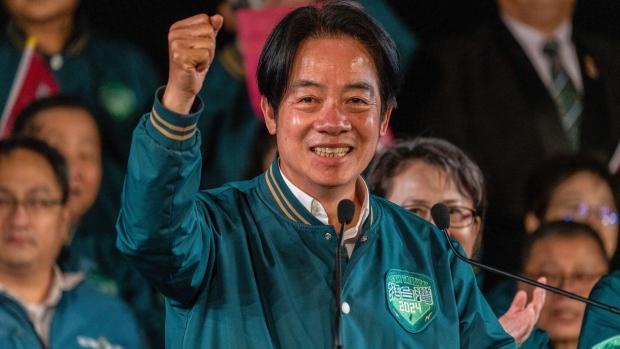Jan 13, 2024
Taiwan’s Next President Is Former Kidney Doctor Beijing Despises
, Bloomberg News

(Bloomberg) -- Lai Ching-te has spent the past year convincing voters he can keep the peace, despite being despised by Beijing. His ability to deter conflict will be tested now his Democratic Progressive Party has won a record third straight presidential victory.
Lai has a daunting task ahead. The 64-year-old former kidney doctor, who entered politics after military tensions flared with Beijing in the mid-1990s, is responsible for balancing his island’s delicate relationships with Washington and Beijing.
That challenge comes as the Taiwan Strait faces fresh tensions. Chinese President Xi Jinping is ramping up pressure on the self-ruled island, which the ruling Communist Party claims as its own. That’s a threat for the world: Taiwan sits at the heart of the global semiconductor supply chain, meaning any conflict poses a $10 trillion risk to the international economy.
See: Taiwan Elects Leader China Calls ‘Troublemaker’ in Blow for Xi
Lai is mindful of the danger. During his measured campaign he walked back old claims that he’s a “pragmatic worker for independence” — a declaration that incensed Beijing. His stated position now is that Taiwan is already a de facto state, and therefore doesn’t need to declare its independence.
In a celebratory speech Saturday night in Taipei, Lai indicated he’d maintain close ties with the US and pledged to keep peace across the Taiwan Strait.
“Washington would like to be able to work with whoever wins,” said Jennifer Welch, chief geo-economics analyst with Bloomberg Economics, who previously served as director for China and Taiwan on the US National Security Council.
“It would like for them to continue to invest in Taiwan’s defense and not pursue unilateral changes to the cross-strait status quo,” she added. “Lai checks all three boxes.”
Because China views Lai with deep distrust “some degree of tension is likely,” she said. Lai urged voters to support “China’s least favorite candidate” during his campaign, after Beijing branded the Harvard-educated doctor a “separatist.”
Earlier in his political career, Lai played a key role in expanding Taiwan’s high-tech chip manufacturing industry, which has helped the island prosper and raised its global profile. While serving as mayor of the southern city of Tainan, one of his major triumphs was securing a new Taiwan Semiconductor Manufacturing Co. plant in a local science park.
The outgoing vice president has also held roles in local and central government, including in the legislative branch where Lai showed that despite being soft-spoken and mild-mannered, he can take a strong stand.
In 2005, he clashed with a Kuomintang lawmaker in the legislature after the opposition party repeatedly boycotted the budget for arms procurement. A video showed him swearing at the lawmaker and shouting: “The country is being destroyed by you people.” Only a small fraction of the more than $15 billion budget was passed in the years immediately after.
Another incident that highlights his hard-nosed — some may say stubborn — character was when he challenged President Tsai Ing-wen for the presidential ticket in the last election, a surprise move against an incumbent leader that struck many observers as insubordinate.
“What he worried about at that time was whether the DPP would lose the 2020 presidential election,” said Chen Jyh-hong, who taught Lai when he worked at a hospital in Tainan three decades ago. Tsai won a landslide.
Read more: Taiwan’s Election Is All About War
Spats and surprise challenges are likely a thing of the past, as Lai embarks on a diplomatic career on the world stage. That feat is all the more impressive given his tough start in life.
Lai was born in 1959 into a coal-mining family on the northern coast of Taiwan. His mother raised six children by herself after Lai’s father died in an accident when the vice president was age two. Despite that, Lai attended top schools and eventually became a doctor, fulfilling his mother’s dreams. She was upset when he quit for politics.
“My mother did not approve,” Lai told Bloomberg News last year. “But she loved me, and she said to me that if the people support what you’re doing, then continue doing it.” It’s a mantra he’ll need to keep in mind as the democratically elected leader of 23 million people.
©2024 Bloomberg L.P.





